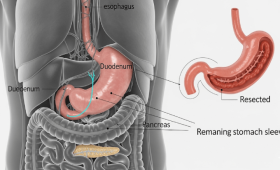What is Gastric Sleeve (Sleeve Gastrectomy) Surgery?
Gastric Sleeve is a surgical procedure in which approximately 80% of the stomach is removed, and the stomach is transformed into a banana-shaped tube. This surgery works by restricting food intake and reducing appetite hormones.
Since the part of the stomach that produces Ghrelin, known as the hunger hormone, is removed, patients feel less hungry after the surgery. The surgery is performed laparoscopically, meaning with small incisions in the abdomen. As food absorption is not interfered with, the risk of vitamin and mineral deficiency is lower compared to other surgeries.
What is Gastric Bypass Surgery?
Gastric Bypass (Roux-en-Y) is one of the most common bariatric surgery methods. This surgery involves creating a small pouch at the top of the stomach and connecting this pouch directly to the small intestine.
Food bypasses the main part of the stomach and the first part of the small intestine, going directly to the lower part of the intestine. This method both restricts food intake and reduces nutrient absorption. It is a highly effective method and is often preferred for patients with co-existing conditions such as diabetes and reflux.
What is Gastric Banding Surgery?
Gastric Banding is an operation performed by placing an adjustable silicone band around the upper part of the stomach. This band creates a small pouch in the stomach and helps the patient feel full with less food. Unlike the other two methods, the gastric band is a reversible surgery and does not interfere with food absorption.
The weight loss process can be controlled by adjusting the tightness of the band after the surgery. However, it is less preferred today due to the risk of long-term complications such as band slippage or erosion.
What is the Difference in the Working Mechanisms of the Surgeries?
All three surgeries work on the basic principle of restricting food intake. However, the additional mechanisms are different. Gastric Sleeve works by reducing the stomach’s volume and lowering hunger hormone levels, while not interfering with nutrient absorption.
Gastric Bypass provides faster and more effective weight loss by creating both volume restriction and malabsorption. Gastric Banding only restricts volume by constricting the upper part of the stomach; it has no hormonal or absorptive effect. These differences determine the potential outcomes and risks of each surgery.
Which Surgery Provides More Weight Loss?
Gastric Bypass is generally considered the method that provides the most weight loss in the long term. Patients can lose an average of 70-80% of their excess weight. Gastric Sleeve is also quite effective and generally leads to a loss of 60-70% of excess weight. Gastric Banding provides the least weight loss among the three methods; patients lose about 40-50% of their excess weight. However, the success of each surgery depends on the patient’s adaptation to lifestyle changes and regular follow-up appointments.
Is There a Difference in the Recovery Processes?
Gastric Sleeve and Gastric Bypass surgeries, due to their more complex surgical procedures, generally require a longer recovery process. Patients usually stay in the hospital for 2-3 days, and the return-to-work period varies between 2-4 weeks.
Gastric Banding surgery is the least invasive, so patients can be discharged faster. However, additional check-ups and visits may be required to adjust the band. In all three operations, patients are encouraged to start walking in the early post-operative period.
Which Surgery Carries a Lower Risk of Complications?
Gastric Sleeve surgery carries a lower risk of complications compared to the other two surgeries. Since no foreign object is placed in the stomach and no intestinal connections are made, the potential complications are fewer. Gastric Bypass has risks such as internal hernia and ulcers, while Gastric Banding has a risk of band slippage, erosion, or infection. However, all bariatric surgeries can minimize risks in direct proportion to the surgeon’s experience and the patient’s general health status.
Which Surgery is More Suitable for Reflux?
Gastric Bypass is the most suitable option for reflux patients, as it reduces or eliminates the backflow of stomach contents into the esophagus (reflux). Since the part containing most of the stomach acid is bypassed, reflux complaints usually improve after surgery. Gastric Sleeve, on the other hand, can increase reflux complaints or cause new reflux. Therefore, for patients with severe reflux problems, Gastric Bypass may be preferred over Gastric Sleeve. Gastric Banding can also cause reflux, in which case the band may need to be loosened.
What is the Reversibility Status of the Surgeries?
Gastric Banding is the only reversible bariatric surgery method. The band can be easily removed, and the stomach can return to its former state. Gastric Sleeve surgery is technically irreversible because a large part of the stomach is permanently removed. Gastric Bypass is also technically reversible, but this procedure requires a very complex and risky revision surgery. Therefore, the patient and the surgeon should carefully consider this factor when choosing a surgery.

How is Nutrient Absorption Affected After Surgery?
Gastric Bypass is the only method that reduces nutrient absorption. Since a part of the small intestine is bypassed during the surgery, the absorption of vitamins and minerals, especially iron, vitamin B12, vitamin D, and calcium, is reduced. Therefore, it is mandatory for Gastric Bypass patients to use vitamin and mineral supplements for life. Gastric Sleeve and Gastric Banding do not affect nutrient absorption, but due to small portions, vitamin intake may be insufficient, and supplements may be necessary.
Which Surgery is More Effective for Diabetes?
Gastric Bypass is the most effective bariatric surgery method for the treatment and control of diabetes. The surgery causes hormonal changes that rapidly break insulin resistance and normalize blood sugar levels. Many patients can stop their diabetes medication shortly after surgery. Gastric Sleeve is also very effective for diabetes, but the hormonal benefits of Gastric Bypass are more pronounced. Gastric Banding is less effective than the other two methods in this regard.
Is There a Difference in the Costs of the Surgeries?
Generally, Gastric Bypass and Gastric Sleeve surgeries are similar in cost. Prices vary depending on the quality of the hospital, the surgeon’s experience, the technology used, and the services included in the surgery package. Gastric Banding is generally a lower-cost option than the others. However, there may be additional costs for band adjustments and potential complications. Therefore, all these factors should be considered when evaluating the total cost.
Is There a Difference in the Surgery Durations?
The longest operation is generally Gastric Bypass (an average of 1.5-3 hours). This is due to the complexity of the surgery. Gastric Sleeve surgery is usually completed in 45 minutes to 1.5 hours. Gastric Banding is the shortest of the three methods and usually takes 30-60 minutes. The surgery durations can vary depending on the surgeon’s experience and the patient’s anatomical features.
Which Surgery Has More Reliable Long-Term Results?
Gastric Bypass and Gastric Sleeve are methods with a large amount of scientific data on their long-term results and are proven to be reliable. The fact that Gastric Bypass has been performed for over 30 years has proven its long-term effectiveness and reliability. Gastric Sleeve has also become widespread in the last 15 years and has achieved very successful results. Gastric Banding is less preferred today due to problems such as band slippage and insufficient weight loss in the long term.
Who is the Most Suitable Candidate for Each Surgery?
The most suitable surgery is determined based on the patient’s general health status, body mass index (BMI), existing comorbidities, and lifestyle. Gastric Sleeve is suitable for patients who have difficulty controlling their eating habits and especially those with a high BMI. Gastric Bypass is preferred for patients with additional diseases such as diabetes and reflux who aim for greater weight loss. Gastric Banding is suitable for patients looking for a low-risk surgical option and who can adapt to lifestyle changes.
What Should Lifestyle Changes Be After Surgery?
All three surgeries require serious lifelong lifestyle changes to be successful. Patients must eat regular, small meals, pay attention to protein and vitamin intake, drink plenty of water, and exercise regularly. The surgery is only a starting point; real success depends on the patient’s adaptation to this new life. In patients who do not adapt to these changes, weight regain can occur.
Which Surgery Has a Higher Risk of Weight Regain?
There is a risk of weight regain with all three surgeries, but Gastric Banding has the highest risk in this regard. This is because the band does not interfere with food absorption, and patients can consume high-calorie foods with liquids. In Gastric Sleeve and Gastric Bypass surgeries, weight regain can also be seen due to poor eating habits and lack of exercise. The best results are achieved when the post-surgical nutrition and lifestyle rules are strictly followed.
Is Hair Loss Normal After Surgery?
Yes, it is normal to experience hair loss after both Gastric Sleeve and Gastric Bypass surgeries due to rapid weight loss. While the body adapts to the rapid change, it directs energy and nutrients primarily to vital organs. This condition is temporary and usually stops within 3-6 months. To reduce hair loss, attention should be paid to adequate protein intake and vitamin supplements such as B12, iron, and zinc. This risk is lower in Gastric Banding compared to the others.
Why is Psychological Support Important?
Bariatric surgery is not only a physical change but also a major psychological adaptation process. In the post-operative period, it is important to redefine the relationship with food, acquire new eating habits, and adapt to changes in body image. Getting help from a psychologist or a support group during this process can increase the long-term success of the surgery and help patients adapt to their new lives more easily.
What Can Be Done for Sagging Skin After Surgery?
Rapid and significant weight loss can cause skin sagging in the body, especially after Gastric Sleeve and Gastric Bypass surgeries. This condition is usually seen in the abdomen, arms, legs, and breast areas. After weight loss has stabilized, this problem can be corrected with surgical lift operations (tummy tuck, arm lift, etc.). While regular exercise and adequate protein intake can help maintain skin elasticity, surgical intervention is usually the most effective solution.
When Does Exercise Start After Surgery?
Exercise is of vital importance during the post-operative recovery process. Patients are usually encouraged to take short walks a few hours after the surgery. This increases blood circulation and reduces the risk of clots. More intense exercises can be started with the doctor’s approval, usually 6-8 weeks later. Low-impact sports such as walking, swimming, and cycling are ideal for maintaining muscle mass and supporting weight loss.
How Does the Pre-operative Preparation Process Work?
The pre-operative preparation process for bariatric surgery ensures that the patient is physically and psychologically ready for the surgery. In this process, patients are evaluated by a surgeon, dietitian, psychologist, and other specialists as needed. Before the surgery, eating habits are changed, blood tests and other health checks are performed. Quitting harmful habits such as smoking and alcohol is also an important part of this process.
What Are the Possible Side Effects After Surgery?
Common side effects after all three surgeries include nausea, vomiting, diarrhea, or constipation. These conditions usually improve within the first few weeks. More serious side effects include infection, bleeding, and blood clot formation. Additional side effects (e.g., Dumping Syndrome in Gastric Bypass, band slippage in Gastric Banding) may occur depending on the type of surgery. Therefore, it is important to strictly follow the surgeon’s instructions.
Do the Surgeries Leave Different Scars?
Since all three surgeries are generally performed using a laparoscopic (closed) method, a few small incision scars remain in the abdominal area. These scars are much smaller than those from open surgeries and fade over time. Gastric Banding surgery requires fewer incisions than the others, making it the method that leaves the least scarring.

What is Dumping Syndrome and Which Surgery Does It Occur In?
Dumping Syndrome is a condition that occurs when high-sugar or high-fat foods move rapidly from the stomach’s small pouch to the small intestine. Symptoms include nausea, dizziness, palpitations, sweating, and diarrhea. This syndrome is especially seen after Gastric Bypass surgery. Patients usually learn to avoid certain foods to prevent these symptoms. This syndrome is rarely seen in Gastric Sleeve and Gastric Banding surgeries.
How is Alcohol Consumption Affected After Surgery?
Alcohol metabolism changes after bariatric surgery. Since the size of the stomach is reduced and it is bypassed, alcohol enters the bloodstream faster, and the effects of alcohol are felt more quickly. Therefore, alcohol consumption should be severely restricted after the surgery. The fact that alcohol contains “empty calories” and negatively affects weight loss goals is also an important factor.
When is Revision Surgery Most Often Performed?
Revision surgery is performed due to insufficient weight loss, weight regain, or serious complications after surgery (e.g., gastric ulcers, band slippage). Gastric Banding has the highest revision rate due to insufficient weight loss. Revision may also be required in Gastric Sleeve and Gastric Bypass surgeries. However, revision surgeries are more complex and riskier than the initial surgery.
What are the Average Hospital Stay Durations?
After Gastric Sleeve and Gastric Bypass surgeries, patients usually stay in the hospital for 2-3 nights. This duration can vary depending on the complexity of the surgery and the patient’s general health status. Gastric Banding surgery is usually a same-day procedure, and patients can be discharged the same day or the day after. The length of hospital stay is important for monitoring the success of the operation and ensuring initial recovery.
What is the Role of the Psychologist in Surgery Selection?
Psychologists evaluate and support patients in the pre- and post-operative period. They determine whether the surgery is suitable for the patient’s psychological state, identify eating disorders or emotional eating habits, and develop strategies to cope with them. In the post-operative period, they help patients adapt to their new lifestyle and maintain their motivation.
In Which Surgery Do Eating and Drinking Habits Change More?
Gastric Bypass and Gastric Sleeve surgeries require the biggest change in eating and drinking habits. Since the size of the stomach is reduced, patients can eat very small portions. It is mandatory to drink liquids separately from meals and to chew food very well. Gastric Banding surgery also requires portion control, but the nutrition rules are less strict than the others.
Which Surgery Has a Greater Need for Vitamin Supplements?
Gastric Bypass surgery is the method with the greatest need for vitamin supplements because it reduces nutrient absorption. These patients must use iron, B12, vitamin D, and calcium supplements regularly for life. Supplements may also be required in Gastric Sleeve surgery, but the need is less because there is no malabsorption. In Gastric Banding surgery, vitamin supplementation is usually recommended when needed.
Which Surgery’s Technique is More Complicated?
Gastric Bypass surgery is the most technically complicated surgery because it requires the rearrangement of the stomach and small intestine. The small intestine must be cut and two separate connections (anastomoses) must be made. Gastric Sleeve surgery is performed by removing a part of the stomach and creating a single staple line. Gastric Banding is the simplest technique because it does not require cutting or rearranging an organ.
Which Surgery Has a Greater Effect on Body Hormones?
Gastric Bypass is the bariatric surgery method that has the greatest effect on body hormones. It creates changes in intestinal hormones, increasing the feeling of fullness and reducing appetite. Gastric Sleeve surgery also has a hormonal effect because it removes the part of the stomach that produces the hunger hormone Ghrelin. Gastric Banding has no hormonal effect; it only physically restricts food intake. This hormonal effect is especially important for patients with diabetes and metabolic syndrome.



